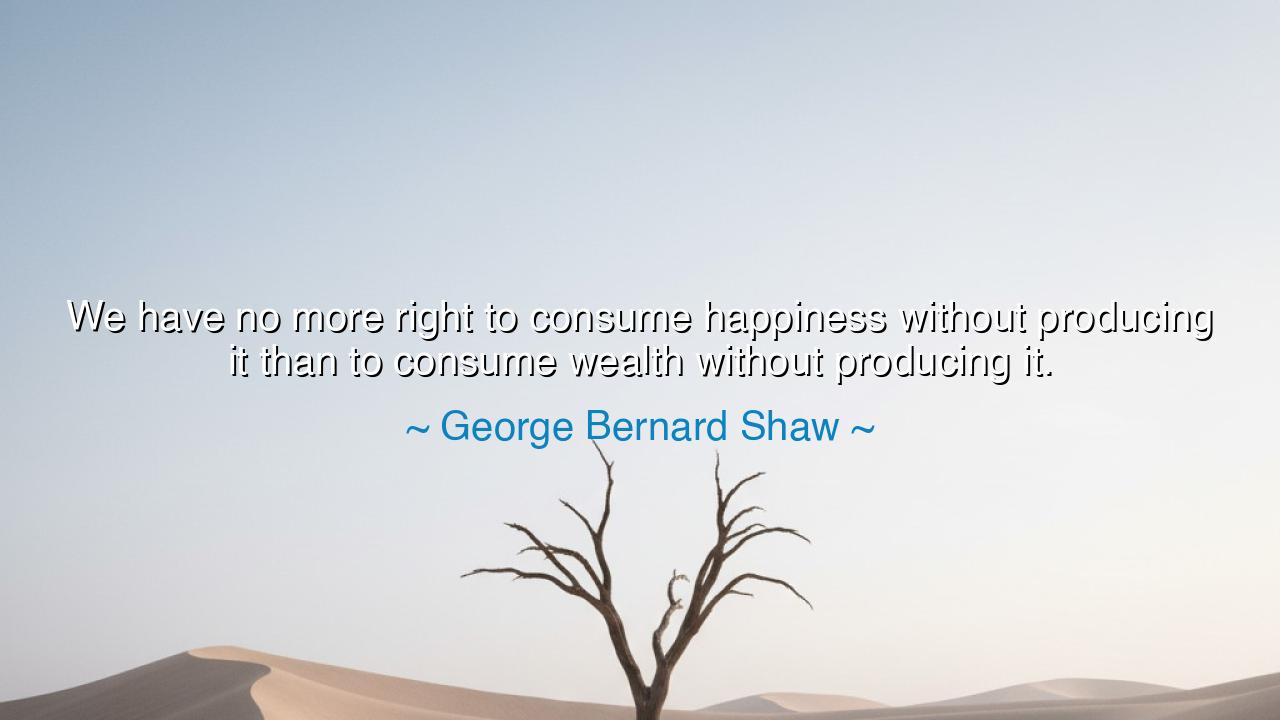
We have no more right to consume happiness without producing it
We have no more right to consume happiness without producing it than to consume wealth without producing it.






The great Irish playwright and philosopher George Bernard Shaw, a man who wielded words like a sword and conscience like a flame, once declared: “We have no more right to consume happiness without producing it than to consume wealth without producing it.” In this truth, Shaw binds together the moral and the spiritual, the social and the personal. He reminds us that happiness, like wealth, is not something to be taken selfishly, but to be created, shared, and earned. His words call forth an ancient law of balance — that the joy one takes from the world must be matched by the joy one gives back to it.
To understand the depth of this teaching, we must recall the age in which Shaw lived — a time of industrial upheaval and vast inequality. Factories thundered, fortunes grew, and empires rose, but in the shadows, poverty and despair spread among the workers who built them. Shaw, ever a champion of justice, saw that many consumed the fruits of others’ labor while giving nothing in return. But his wisdom goes beyond economics; it pierces to the heart of the human spirit. Just as it is wrong to consume wealth without creating value, it is equally wrong to take happiness from life — from love, from companionship, from society — without giving happiness in return. For to take without giving is to break the moral harmony of existence itself.
The ancients, too, understood this sacred balance. The philosopher Aristotle taught that happiness — eudaimonia, the flourishing of the soul — comes not from pleasure or possession, but from virtue and action. In other words, happiness must be earned through goodness. To receive joy, one must also be a giver of it. Shaw’s words echo this timeless idea, clothed in the moral language of the modern world. They tell us that happiness, like light, cannot be hoarded — it exists only when it is shared. He reminds us that to live joyfully is not a passive state, but an act of creation, a labor of the heart.
History is filled with those who embodied this truth. Consider Mother Teresa, who walked the streets of Calcutta, surrounded by suffering, yet radiated peace. She did not seek happiness as something to be consumed; she produced it, through service, compassion, and love. Her joy was not the shallow kind born of comfort or ease — it was the deep, enduring happiness that arises when one’s life becomes a blessing to others. Like Shaw’s teaching, her life proves that true happiness flows from giving, not taking; from creating harmony, not merely enjoying it.
There is a quiet warning hidden within Shaw’s words. To consume happiness without producing it — to demand joy without effort, comfort without compassion — leads to emptiness. The one who seeks only to be entertained, adored, or indulged becomes hollow, for happiness without purpose soon turns sour. The soul, like the body, grows weak when it does not labor in goodness. We must, therefore, become craftsmen of joy, shaping it not only for ourselves but for the world around us. For every smile we give, every kindness we sow, every wrong we help to mend, we create the substance of true happiness — not fleeting pleasure, but enduring peace.
Shaw’s philosophy is also a call to responsibility. Just as one who consumes wealth without producing it becomes a burden upon society, one who takes happiness without giving back becomes a burden upon the soul of humanity. The wise understand that joy, like wealth, grows only when circulated. A community thrives when its people lift one another, when happiness flows like a river through shared gratitude, service, and love. To produce happiness, one must act — not only with words, but with deeds that heal, encourage, and illuminate.
So, my child, take this teaching and make it the measure of your life: do not merely seek happiness — create it. Be a builder of joy. Wherever you go, leave behind more light than you found. If you receive kindness, repay it with compassion; if life gives you laughter, share it with others; if the world gives you comfort, use it to ease another’s pain. For the happiness that you create is the only happiness that endures. As George Bernard Shaw teaches us, to live rightly is to give back what we take — to let every breath, every action, every word become a small act of creation, adding to the harmony of the world. And when you do, you will find that happiness, once produced, never leaves you — for it lives on in every heart it has touched.






AAdministratorAdministrator
Welcome, honored guests. Please leave a comment, we will respond soon